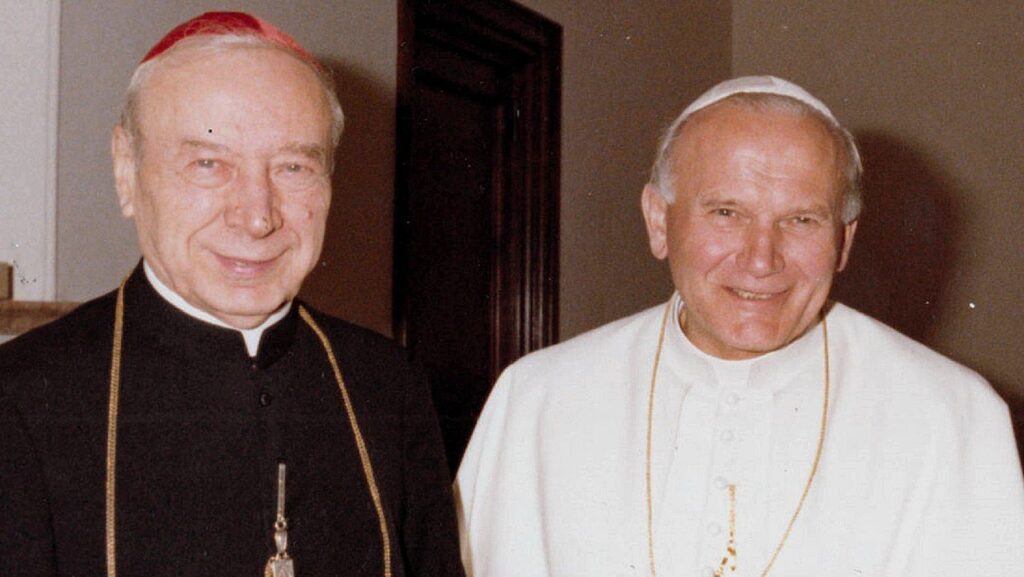
Cardinal Stefan Wyszynski with Pope John Paul II in October 1980
A few days ago, I watched Prophet, a Polish film which, in my opinion, correctly tells the story of Cardinal Stefan Wyszynski from the time of his release from prison, on 26 October 1956, until the election of Pope John Paul II. The cardinal primate of Poland from 1948 until his death in 1981, Wyszynski had been imprisoned in 1953, during the communist authorities’ persecution of the Catholic Church. He was released only because the secretary general of the Communist Party (the United Workers’ Party of Poland), Władysław Gomułka, wanted the cooperation of the Polish Church in the elections that were to be held the following year.
Gomułka had been imprisoned in 1951 by his predecessor, Bolesław Bierut, for opposing Stalin’s policies. He was released from prison in 1954, a year after Stalin’s death, and initiated a series of reformist policies known as the ‘Gomułka thaw’ following the 1956 workers’ protests in Poznań. The new communist leader understood the strength that Catholicism retained among the Polish people, despite the regime’s efforts to teach the wonders of socialism to stubborn Poles and decided to negotiate with Wyszynski. The film focuses on the regime’s negotiations with the primate, who tried to restore the work and mission of the Church under the tight control and occasional repression of the communist authorities.
The film reminded me of an incredible story that also happened in Poland during those turbulent years. Just as the Soviets wanted to turn East Berlin into a model city of socialist paradise in the face of the decadence of West Berlin (we all know how that story ended), the Polish communists built a new socialist city very close to Krakow: Nowa Huta, meant to house more than 30,000 workers who were to work in the new Lenin Steelworks. Nowa Huta was inaugurated in 1954, after five years of work, as a model socialist city: a huge central square dominated by a huge statue of Lenin; parks and lakes to enjoy with the family; wide avenues for strolling, and so on. There were no churches in Nowa Huta, because the workers did not need God. But the stubborn Polish workers wanted a church, and the authorities, in the spirit of the ‘Gomułka thaw,’ allowed one to be built in 1958. The events of Nowa Huta are not mentioned in the film, but we do see Wyszynski meeting a young priest, Karol Wojtyła, to tell him that the pope had appointed him Auxiliary Bishop of Krakow. That priest—the future pope—would play a key role in this story.
Eager to celebrate their faith, the people of Nowa Huta erected a wooden cross on the site designated for the church and began celebrating mass regularly. However, the celebration of mass in what was supposed to be a model socialist town must have caused more than one party leader to break out in hives, so the authorities decided to renege and forbid the construction of the church. Wojtyła tried in vain to persuade the communists, but they did not listen. So, on the morning of 27 April 1960, a group of workers came to tear down the wooden cross. Passers-by confronted them and spread the word. Within a short time, a crowd of Nowa Huta residents had gathered to prevent the cross being torn down. The authorities saw this as an act of rebellion and called in the militia, who used truncheons and tear gas against the defenders of the cross; but the defenders refused to back down and the clashes continued until nightfall.
Gomułka called the demonstrators “scum” and “rioters,” and around 200 people were jailed, fined,or lost their jobs as a result of the riots. The atmosphere was very tense, but the cross remained in place. Wojtyła intervened with the authorities and, from then on, the protests in favor of the church were peaceful. Seven years later, in 1967, the Nowa Huta workers were able to build their church (next to the cross for which they had fought so hard), the Ark of the Lord (Kościół Arka Pana). It was consecrated in 1977 by Wojtyła himself, then a cardinal. Today, Nowa Huta is a district of Krakow; the central square is called “Ronald Reagan” and it is dominated by a monument to the Solidarity trade union.
Returning to the film, there are two sentences that sum up the moment in which the protagonists are living. The first comes from Bishop Antoni Baraniak, who we see being brutally tortured by the police at the beginning of the film: “You can’t trust the communists”; a lesson in political common sense that many seem to have forgotten. The other is from Cardinal Wyszynski: “Evil can be overcome with good and truth”; another lesson in faith and life that many have also forgotten. Wyszynski, who will be beatified in 2021, was an exceptional man in very difficult times because he was not afraid to speak the truth and to confront evil. Such men—like Karol Wojtyła, the defenders of the Cross of Nowa Hutta, and the workers of Solidarity—had the faith and courage to stand up to a lie and played a key role in bringing it down. They are the mirror into which the West must look.